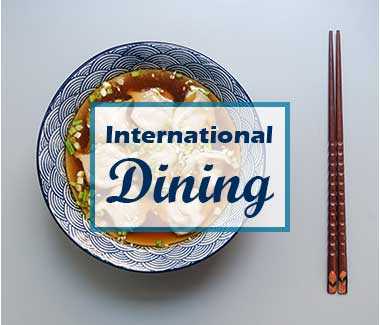Pakistan Dining Etiquette
Dining etiquette for eating with Muslims. Islam prohibits the use of pork, and meat for Muslims should be prepared halal. Do not eat in front of Muslim colleagues, or invite them to join you for a meal, during the day during Ramadan.
Drinks
Dining etiquette for drinking. When offered, always accept tea, even if you only put it to your lips or just take a few sips. Your cup will always be refilled if it is less than half full. Because you must never pour your own drink, you must always be alert throughout the meal as to whether your neighbor's cup or glass needs refilling. If it is less than half full, it needs refilling; alternately, if yours is less than half full your neighbor is obliged to refill it. If he or she does not, do not refill it yourself. for this will cause your neighbor to lose face; instead, diplomatically indicate your need by pouring a little more drink into your neighbor's glass, even if it doesn't really need it.
Toasting Etiquette
Dining etiquette for toasting. If you are the honored guest, you should make a toast, usually soon after the host does or at the end of the meal, just before everyone departs.
Table Manners
Dining etiquette for eating in Pakistan or Bangladesh. Food is eaten with spoons, forks, and knives, if necessary, or with no utensils at all. Since the spoon is more important than the fork, if you are right-handed, keep the spoon in your right hand, and put it down to switch to the fork if you need it: never use your left hand for eating, especially if you are eating directly with your hands.
Dining etiquette for eating with your hands. The type of food eaten with the hands is known as "banana-leaf' food. Reach into the rice, take some with your fingers, gently roll it between your index and middle fingers and thumb into a self-sticking ball, dip it into the sauce on the banana leaf, mix it with a vegetable or a piece of chicken, then pop the whole thing in your mouth.
Wash your hands before you sit down to eat and again at the end of the meal.
Dining etiquette for eating in a restaurant. Men and women, in some establishments, may be asked to dine separately.
Women should be careful not to directly touch food that is being served to a Muslim male, other than those who are her immediate relatives
Do not take the last bit of food from a central serving plate; that means there will be none left in case someone else wants more. Also, a sauce may be mixed with rice, and eaten together with the main dish. You are not expected to hold the rice bowl up by your mouth.
Dining etiquette for seating. The host sits at the head of the table, with the honored guest seated next to the host. The honored guest sits on the side of the table farthest from the door. (At business meetings, the key people sit in the middle, flanked on either side in descending order by their aides, with the least important people sitting at the ends of the table farthest from the middle and closest to the door.
Men and women eating at someone's home may dine in separate areas or at separate times, with the men dining first.
Dining etiquette for serving food. The honored guest is served first, then the oldest man, then the rest of the men, then children, and finally women.
Dining etiquette for beginning to eat. Do not begin to eat or drink until the oldest man at the table has been served and has begun.
Dining etiquette for the end of the meal. At the end of the meal, it is appropriate to thank the host or hostess for a wonderful meal.
Dining etiquette for talking business. Business meals are generally not good times to discuss business or make business decisions. Take your cue from your Pakistani or Bangladeshi associates: if they bring up business, then it's okay to discuss it, but wait to take your lead from their conversation.
Dining etiquette for eating in a home. When you are at a colleague's home for a formal meal, you will be invited to sit anywhere you like at the table: resist the impulse to sit down, and wait until your host gives you further instructions. These will generally come after the host or the oldest male is seated and often you will be placed at his side. It is a great honor to be invited into a Pakistani or Bangladeshi home. Once invited in, you may need to remove your shoes (this is not the custom in restaurants, however). If you move from room to room in someone's home, be sure to always allow the more senior members of your party to enter the room ahead of you.
Dining etiquette for paying the bill. Usually the one who does the inviting pays the bill, although the guest is expected to make an effort to pay. Sometimes other circumstances determine the payee (such as rank). Making payment arrangements ahead of time so that no exchange occurs at the table is a very classy way to host, and is very common. Western businesswomen will not have a problem paying the bill at a restaurant, but be sure to make payment arrangements ahead of time, and don't wait for the check to arrive at the table.
Dining etiquette for tipping. Tipping is universally required, everywhere you can imagine-and then some. Tips in restaurants run about 10 percent.

-clean.jpg)
